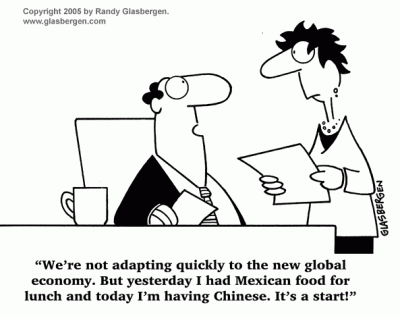
Yesterday, I was part of a discussion on standards as it relates to doing business. I find Global Business Leadership totally fascinating.
Now having lived in England, Canada and the United States, and worked with Sweden, Australia, Brazil, Argentina, Columbia, Switzerland & India, I found myself saying:
“What country? What culture? What industry? What? What? What?
I needed more criteria to really embrace the discussion. I usually enjoy these discussions but for some reason, on this occasion, I found myself lost in my thoughts and reflections.
When I first started my professional journey, I was sure I was clear about my sandbox and the standards I needed to abide by. However, as I crossed many borders and gained more knowledge, I realized that so many standards are relative. In fact the more knowledge I gained, the more I realized I had so much more to learn.
Secondly, I have scars as it relates to attaining one global standard for a global organization with over 10 countries sitting around the table! I kid you not. I can also name a few of my colleagues who can compete with me showing you those scars! LOL! They were painful discussions.
As a result, I have decided to write a series of posts on:
“Cross-Cultural Business Global Leadership”.
Is there such a term? Don’t know. What I do know, is that I really would like to have this discussion with you. Especially at this time – when social media is breaking down the walls to increase transparency and yet our interpretation of our messages may be all over the place because of the very diverse cultures that we bring to the “screen”.
This post is a general introduction about conducting business on a global level.
Defining Global
Now the first order of clarification from my perspective is the word “global”. I have been in so many “global organizations” where they use the term global and what it really means is wherever the head office resides ( be it UK, US, Canada, Japan- wherever), the way the business will be conducted in other countries, will be the same as the head office country. So their interpretation of global is that we are doing business IN that country -not WITH that county. Wrong! Gosh, how many blunders have there been because global business leaders think they can just put a template of their home operation into a different country and expect it to work? Countless times! It just does not work like that. Perhaps if the mindset was: We are doing business WITH the country ie WITH the people in that country- the risk of blunders would be minimized. Global should mean doing business within a country that would be seamless as possible to employees and this new customer base. It is being a master international, business chameleon. This is my definition.
Business Thinking
When conducting business, individuals often focus on how they think, not how the other party views the situation. This built-in bias is generally detrimental and can be toxic for international transactions and businesses. It can set you up for failure as it can contribute to the possibility of making cultural blunders that have negative impact on business relationships.
Cultural Differences
Those who fail to recognize cultural differences and concerns will frequently destroy what could have been a successful transaction. More importantly, the global leader, consultant or investor who has made the offence, typically is not even aware of the blunder that spoiled relations in the first place and caused the loss a potentially good opportunity. Sadly these leaders will also have a long learning curve, as many cultures will not share their blunder. Why? Out of respect.
I have witness this so many times. There have been times when I have had to take the global leader aside to share his or her misstep and why staff or other leaders are not motivated by their message delivery (or their presence). Global leaders should not interpret nodding heads as agreement or commitment. In fact it can mean quite the opposite.
Relationship Building
In many cultures, relationship building is imperative, let alone critical, before any discussion of business can occur. We in North America are very business task/transaction focused. Others are not ,or I perhaps I should say -do not always put that discussion as the first item on the agenda to developing a business partnership.
My first trip to Argentina was such an education. Wonderful experience. I had  to totally rethink my style. Luckily, I did a lot of reading before meeting my counterparts. The first two days in Argentina was all about relationship building and getting know each other. Beautiful country! Here in Canada, the US and my country of birth, England- we get down to business almost immediately. Usually wanting to see numbers as soon as possible and then documenting everything in sight, what’s been said with a whole bunch of assumptions. Sometimes we really need to take a pill and relax a little.
to totally rethink my style. Luckily, I did a lot of reading before meeting my counterparts. The first two days in Argentina was all about relationship building and getting know each other. Beautiful country! Here in Canada, the US and my country of birth, England- we get down to business almost immediately. Usually wanting to see numbers as soon as possible and then documenting everything in sight, what’s been said with a whole bunch of assumptions. Sometimes we really need to take a pill and relax a little.
The Financials
A focus on only net financial benefits, such as a rate of return analysis, may be extremely short sighted especially when dealing with other cultures. Though a return on investment is crucial in most business circumstances, other issues such as family relationships or prestige may be of more importance, at least in the short term. This is especially true in most Asian countries.
Documentation
In the United States it is generally not an insult or unusual for a long legal document to outline a partnership or transaction. The quality of the partnership is related to the weight of that document- ok I jest; being a little naughty but just a little ;). However, in many Eastern European and Asian countries, it could be considered an insult to have an extremely detailed document, as it could imply that the person presenting it doesn’t trust them.
In the United States, Canada and England, for example, the contract is the document that ultimately defines the transaction. But elsewhere, it can be the starting point of the discussion. Now talk about the need to get aligned!
So What About Those Standards?
So I will finish this post, where I started. Standards are relative and quite frankly should be made to be flexible – which by definition is not a standard. Like the term “unconference”, lets call it “unstandards”. What do you think?
Thank goodness, I had that discussion yesterday! I have been meaning to write about this for ages! It feels good to get it out. Ooopsie!
Cheers- your turn…
Shirley
Cartoon used with the permission of the Cartoonist; image by Pat McDonald
Related articles
- To Ensure Successful International Expansion, Join the Global Village (theinternationalexpert.com)
- A New Era for Global Leadership Development – HBR (bjconquest.com)


 April 12, 2012
April 12, 2012 




Thoughtful discpurse………!
Thanks! It has been in my head for sometime. I am glad I got it out to make room up there. LOL!
This is excellent. Your post touches on issues I wrestled with as a member of the management team for a Global 100 manufacturing firm. Thank you for not only an extremely insightful post, but one timely for today’s business interactions.
Thank you Stephen! Professionally I grew up in global R&D as well as global manufacturing. 20years Pharmaceuticals in my pocket. Great experience. At the same time, global leadership was certainly a challenge. I am so glad you found some pearls here. I can totally relate to your situation. Cheers!
Shirley:
We are living in a Global Economy and there should be and will eventually be a standard of conducting business as such.
This subject digs deep and goes far and wide. As a real estate broker in cosmopolitan, metropolitan and the Internationally acclaimed City of Miami Beach, Florida USA. I’ve seen MANY peculiar customs and superstitions come up in things I would never imagine.
For example, The Japanese will not entertain a property where 9’s are in the address or apartment number (for example). Religious Jewish Women, DO NOT look a man other than her husband in the eyes.
Could go on and on..
Mott
I love it when you come out to play! As always –thank you for providing this perspective.
You hit on my very point. We really need a broader definition of business standard that is more inclusive of our diverse make-up.
Believe it or not, I also went to a predominantly Jewish high school. This too provided exposure to some of their customs. Personal space, eye contact and hair are important behavioral attributes in this circle.
The condo I once lived in did not have any floors that had a 4 in it ie 4,14, 24 etc. 4 is unlucky in the Chinese culture. We have one of the largest Chinese population outside China. It did not have 13 either.
Now can you imagine if we did not accommodate for this, the lost opportunities? Like you, I can give countless examples and probably will in future posts. Love this topic.
For this post the message is: If we do not broader our thinking on what encompasses these business “standards” or flex them to be more inclusive, I believe we will fail in this global economy. Some of these cultural traits are very subtle and yet very important. Depending of your background, you may not give it a second thought until faced with it and even then it takes some experience to understand the implications. My takeaway is – be open to them and try to think and learn about them before doing business. So that you come from a point of knowledge. Great point Mott! Love the conversation.
Cheers!
Thank you for giving us this perspective.
Thank you for visiting.
A great book on this topic is Global Business Leadership by Wibbeke: http://www.amazon.com/Global-Business-Leadership-E-S-Wibbeke/dp/0750684089
http://www.geoleadership.com
Thank you for the reference. I really appreciate it.
Cheers!